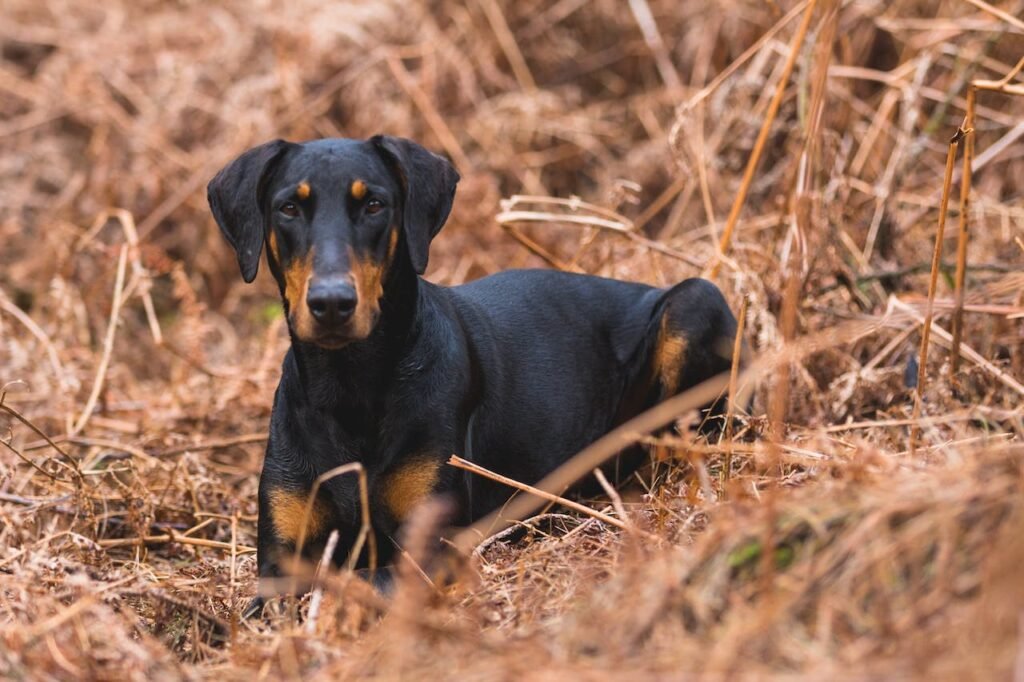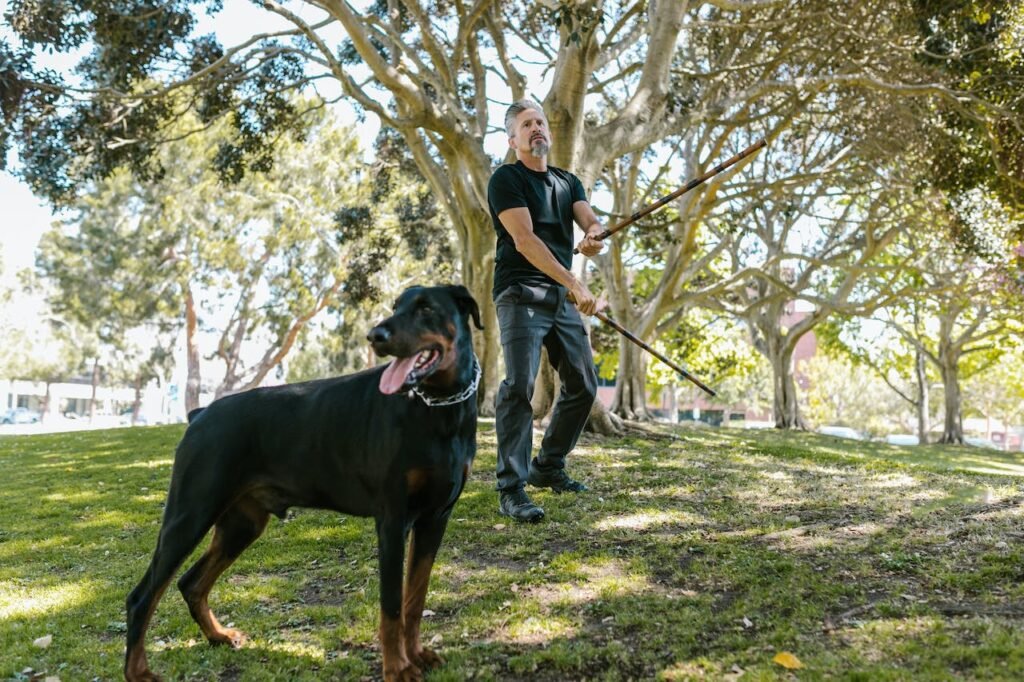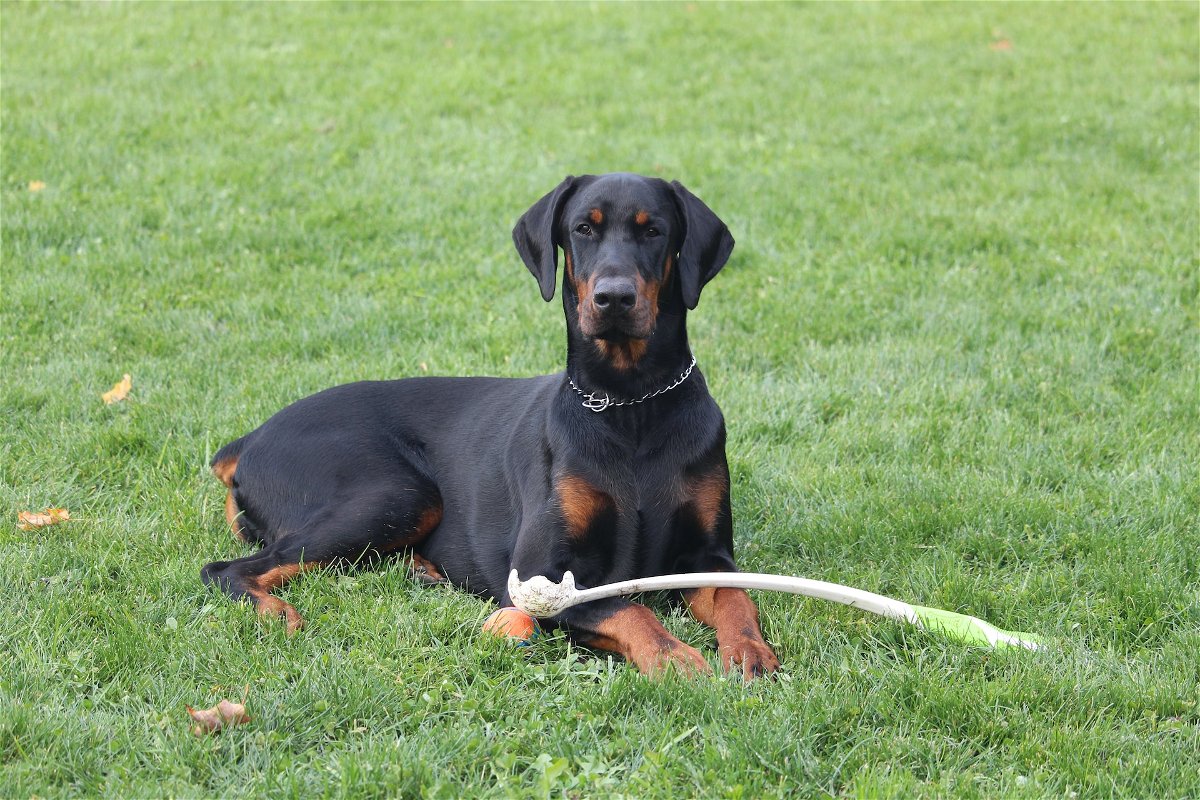We're an affiliate
We hope you love the products we recommend! Just so you know, we may collect a share of sales or other compensation from the links on this page at no additional cost to you. Thank you if you use our links, we really appreciate it!
The Doberman Pinscher dog was specifically bred as a working dog to protect humans. Even though this trait has been watered down over the years, the protecting instincts of Dobermans are still active today.
If you’re planning to add this fearless dog to your family, you may be wondering about their various aspects, including lifespan.
So, how long do Doberman Pinschers live? Follow along as we disclose the average lifespan of Dobermans and what you can do to extend their longevity.
How Long Do Doberman Pinschers Live?
The average life expectancy of most Doberman Pinschers is between 10 – 12 years, but individual cases may vary.
When compared to small dog breeds, Dobermans appear to have a relatively shorter lifespan for a variety of reasons.
Doberman Pinschers are massive dog breeds with muscular frames, and it is commonly known that the larger the dog the shorter their average lifespan.

A good example is Yorkie Poos with an average lifespan of 10 – 15 years, which is a significant difference compared to bigger breeds such as Dobermans.
In addition to size, Doberman Pinschers are also, unfortunately, predisposed to several health conditions that can reduce their lifespan.
What Do Dobermans Usually Die From?
Just like all other animals, the lifespan of a Doberman can be cut short by health problems both acute and chronic, especially in old age.
The following are some of the most common canine diseases that may affect a Doberman:
1. Bloat
Gastric Dilatation-Volvulus (GDV) or Bloat is a life-threatening condition that occurs when the dog’s stomach is filled with fluid and twists around itself.
The inflated twisted stomach prevents the trapped fluid from escaping, causing a pressure build-up which can restrict blood flow to the heart.
Large and deep-chested dogs like Dobermans are more susceptible to this painful condition.
Feeding your dog from an elevated point and avoiding strenuous exercises immediately after meals are some of the preventive measures for bloat.
2. Canine Hip Dysplasia
Hip dysplasia is a genetic condition caused by the malformation of the hip joint due to misalignment between the ball and socket.
Nutritional factors can also contribute to this disorder. Overfeeding your Doberman puppies can increase their risk of hip dysplasia by over 70 percent.
Some of the symptoms of hip dysplasia include pain, reluctance to jump, weakness, stiff hind legs, and difficulty getting up among others.
Your vet will examine your dog’s hind legs with an X-ray to determine the best treatment procedure to take, including surgery.
3. Cancers
Statistics from the American Veterinary Medical Association claim that at least half the dogs above 10 years old will get cancer at some point in their lifetime.
Doberman Pinschers are one of the top five dog breeds that are susceptible to cancer. Unfortunately, many of them succumb to this deadly condition.
Mammary cancer is the leading type of cancer in female Dobermans. Make sure to do lump and bump body checks regularly.
Some of the warning signs of cancers in dogs include sudden weight loss, reduced energy levels, change of appetite, vomiting, diarrhea, limping, and unusual bleeding, among others.
There are various cancer treatment and management options, depending on the type and location.
Early detection can make a huge difference and significantly increase the chances of successful treatment, so make sure to visit your vet regularly.
4. Heart Conditions
Doberman Pinschers, more than any other dog breed, are prone to a life-threatening heart condition known as Dilated Cardiomyopathy (DCM).
This condition causes the affected dog’s heart incapable of efficiently pumping blood because it has become weakened and large.
Some of the signs of dilated Cardiomyopathy include feeling weak, being unable to breathe well, and general body weakness.
Unfortunately, a good number of Dobermans with this condition may not show any signs until sudden death strikes.
The good news is that with early diagnosis and intervention, affected Dobermans can still recover from this genetic heart muscle disorder.
5. Von Willebrand Disease
Just like DCM, this hereditary bleeding disorder is common in Doberman Pinchers and it affects the blood’s ability to form clots.
Von Willebrand’s Disease (vWD) is caused by a lack of a plasma protein known as a von Willebrand factor that helps platelets stick together and form clots and seal broken blood vessels.
Some of the symptoms of this bleeding disorder include; bleeding from the mouth, blood in urine, nose bleeding, anemia, and bleeding from the GI tract.
While there is no cure for this condition, early DNA screening and careful management can reduce the cases of fatalities.

6. Copper Hepatopathy
Inherited defects in copper metabolism can predispose your Doberman to this liver disease known as Copper Hepatopathy.
This disorder is caused by the pathological accumulation of copper in the liver and can cause secondary problems if not managed well.
Copper overload in the affected dog’s liver can lead to inflammation, oxidative stress, cell death, chronic hepatitis, liver issues, and even death.
The possible treatment options include a negative copper balance in the dog’s body by modifying diet and administering copper chelating agents to increase copper excretion from the body.
The chances of successful recovery are great when the treatment procedure is started early, so make sure to screen your dog on time.
7. Glomerulonephritis
Glomerulonephritis is a kidney disease that occurs due to the inflammation of the glomeruli (microstructures in the kidney responsible for filtering blood).
This condition can slowly damage the affected dog’s kidneys if not managed properly. Lack of treatment can consequently lead to kidney failure and death.
What Can Affect a Doberman Pinscher Lifespan?
The following are some of the factors that can affect the longevity of Doberman Pinschers:
1. Genetics
Genetics and breed lineage are one of the leading factors that can determine how long a Doberman, or any other dog breed, will live for.
Responsible breeding practices are meant to tone down undesirable characteristics and contribute to the overall well-being of the upcoming litter.

If you’re intending to purchase your dog, make sure to get one from a reputable breeder who prioritizes health screening of the parents and genetic diversity.
2. Environmental factors
The general environment in which your Doberman lives and their immediate surrounding can have a great impact on their lifespan.
Dogs who are exposed to toxins, pollutants, and other environmental hazards are at a greater risk of contracting diseases or accidents, thereby cutting short their lifespan.
Make sure to set out a comfy personal space for your dog, furnished with a cozy bed and other necessities to keep them happy and healthy.
3. Vaccination
Vaccinating your Doberman Pinscher against common canine diseases provides a great way of keeping them safe against life-threatening conditions such as DHPP and rabies.
Your vet should provide a vaccination schedule for your Dobie from puppyhood all through their adult life. Your Doberman puppy will probably receive their first set of vaccines at about 5 – 8 weeks of age.
Depending on your individual dog, your vet may recommend certain boosters to keep strengthen the immunity of your Doberman throughout their adulthood stage.
4. Exercise
Doberman Pinschers are high-energy dogs who need plenty of exercise to stay physically fit and mentally stable.
Docile Dobies who live a sedentary lifestyle are highly likely to gain extra weight, which can put them at risk of obesity, arthritis, and other related conditions.
On the other hand, a Doberman who lives an active lifestyle with enough playtime and training is highly likely to enjoy extended longevity.
How To Extend the Life of Your Doberman
As a caring Doberman parent, we believe you want your cherished companion to live a longer, healthier, and happier life, possibly surpassing the average lifespan.
If you want your dog to live even for an extra day, you have an important role to play which includes taking the following measures:
1. Proper nutrition and hygiene
Feeding your dog with a balanced and nutritious diet, tailored for their specific needs at different life stages is the cornerstone of healthful living.
Right from their puppyhood stage into their senior years, make sure your Doberman is nourished with high-quality whole foods for optimum nutritional support.
Feed your dog with grass-fed unprocessed meats and avoid giving them foods that may induce obesity and other related complications.
Adding a few dietary supplements to your dog’s food will enrich their diet and strengthen your dog’s body to resist certain chronic conditions.
Make sure to keep your dog clean at all times, including their immediate habitation and surrounding areas.
2. Plenty Exercises
Controlled physical exertion, appropriate for your dog’s age, is crucial for their physical fitness and mental well-being.
Dobermans are high-energy dogs, so they need adequate amounts of daily walks, playtime, interactive sessions, and training.

Physical exercise is also a great way to tone down your dog’s excessive weight. Constant body movements allow your dog to release pent-up energy and promote healthy living.
Be wary of excessive or strenuous physical exercises, because they can lead to joint ailments and make your dog worse as they age.
3. Regular Vet Care
Taking your lovely dog to the vet on schedule is one of the best ways you can help them live a healthy life.
A qualified vet should be able to monitor your dog’s health and perform timely treatment when needed.
Early detection can significantly increase the chances of recovery and this can account for increased longevity.
Your vet will also advise you on the recommended nutrients and supplements that can make your dog healthier at different stages in their lives.
4. Regular Grooming
Sprucing up your dog is not only about aesthetics, but it also helps with healthful living. In other words, a well-groomed Doberman is a healthy dog.
Repeated grooming sessions can keep your Doberman’s coat clean and free from debris which helps prevent skin irritation and infections.
In addition to distributing natural oils on the skin, brushing your dog will also help control shedding, thereby reducing potential allergens in your home.
It’s during these moments that you can slowly inspect your dog by checking for lumps, bumps, hotspots, and other skin issues.
Grooming also helps improve your bonding experience with your dog, and this can account for improved mental well-being.
Bathing your dog using natural shampoo and warm water will also help manage unpleasant odors and keep them smelling fresh at all times.
Conclusion
How long do Doberman Pinschers live? Most Dobies have a lifespan of between 10 – 12 years. This range is comparable to other similar-sized dogs, but it’s shorter than those of small breeds.
Even though Dobermans can face several health issues, you can help them live a healthy life by providing proper nutrition, quality vet care, regular exercise, and meticulous grooming.
Remember early detection and timely treatment can increase the chances of recovery and significantly extend your dog’s longevity.
Laura is the founder of Furs'n'Paws. She is a also a pet writer and expert with more than 20 years of experience of working with dogs and cats. She developed a very strong love for animals at a young age. Her passion led her to establish a thriving pet sitting and dog walking business in Dubai. As an expert in pet training, behavior, and nutrition, Laura is committed to helping pet owners and pet lovers by offering high-quality information on a wide range of topics.



No responses yet